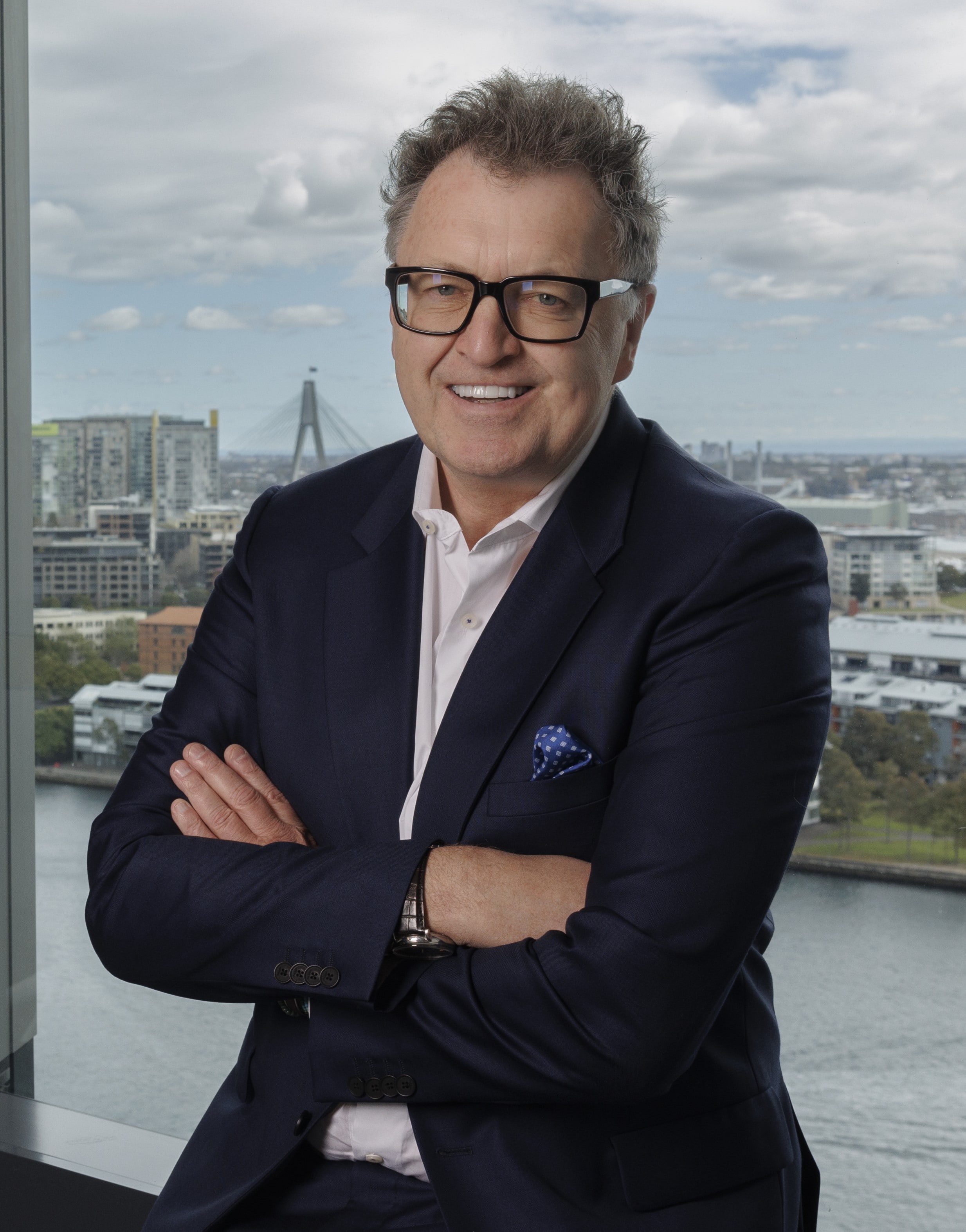PwC’s 28th Annual Global CEO Survey – Australian insights reveals the top priorities, biggest threats, and growing optimism of our business leaders. It uncovers the critical decisions and investments leaders are making in response to defining forces, including technological disruption and climate change.
Message from Kevin Burrowes, CEO PwC Australia
Australian businesses are confident about the future – but are they too complacent?
Welcome to PwC’s 28th Annual Global CEO Survey – Australian insights, a comprehensive analysis of the views of over 4,700 leading CEOs representing every region in the world’s economy, including 116 from Australia.
These results tell us that business leaders across the globe no longer see business model reinvention as an option but as a necessity. Global disruptive forces, such as artificial intelligence (AI) and climate change, are not waiting for us to be ready – they are here and fundamentally changing the way we work. How to maximise the benefits, while mitigating the risks, is still up for debate, but one thing is clear – Australia’s CEOs must act quickly and decisively to navigate the threats, challenges and opportunities on our doorstep.

Astute CEOs are reimagining the companies of tomorrow, today Converging megatrends are compelling Australia’s CEOs to reinvent their business models
PwC’s 28th Annual Global CEO Survey data reveals some of Australia’s leading CEOs are moving forward and moving fast to capture the growth and value-creation potential of disruptive technological and environmental forces.
Yet many others are moving slowly, failing to recognise the scale of threats, challenges, and opportunities, constrained by leadership mindsets and organisational practices that lead to inertia. For those leaders there exists a stark choice: self-disrupt or be disrupted.
Meeting challenges, seizing opportunities
- Converging megatrends are compelling CEOs around the world to reimagine their business models. Our survey spotlights two defining forces that are driving reinvention action: technological disruption and climate change. These super disruptions are forcing business leaders to profoundly reconsider long-held assumptions about how they operate. In response, some CEOs are successfully seizing opportunities from these trends, leveraging them to capture growth, create value, and leapfrog competitors.
- There is evidence of rebounding optimism. Australia’s surveyed CEOs are more optimistic about economic growth than when we last surveyed them. Almost half (47%) expect an improvement in global gross domestic product (GDP) in the next 12 months. Around two-thirds expect an uptick (or stay the same) in Australia’s economic outlook in the year ahead.
- Compared with their global peers, Australia’s CEOs feel confident about their organisation’s future. Almost three quarters (74%) believe their business will be economically viable for more than 10 years if they continue down their current path (versus 55% of global CEOs). Are local CEOs being overly confident?
- Expectations for GenAI remain high; 42% of Australia’s CEOs reported increased efficiencies in their workers' time over the last year as a direct result of GenAI, and 40% expect their investments in the technology to increase profits in the year ahead. Yet trust remains a hurdle to adoption. Only a third of CEOs have a high degree of trust in AI.
- Globally, investment in climate actions and sustainability is paying off. When we asked CEOs about the financial impact of climate-friendly investments, we found these moves were six times more likely to have increased revenue as to have decreased it over the past five years.
Explore the findings
Business as (un)usual: Trends, triggers, and rebounding optimism

“Productivity is the number one challenge for Australia, and for our CEOs. Capital deepening has improved marginally but labour productivity is worsening, and it’s across most industry sectors. Add to this the twin tensions of an ongoing tight labour market and cost pressures, and it’s clear Australia’s CEOs need to rethink their business and operating models now to achieve the productivity they need for the future.”
Amy Lomas, Chief Economist, PwC Australia
Australia’s business leaders brought a growing confidence to our latest CEO Survey, being more optimistic than they were this time last year. Almost half expect an improvement in global gross domestic product (GDP) in the next 12 months. They're almost evenly split on the outlook for the local economy, 35% expect Australia's GDP to improve, 34% say it will stay the same and 29% anticipate a decline.
Elsewhere in the world, CEOs are even more upbeat. Nearly two thirds (58%) expect an upswing in global GDP. This gap, which puts global CEOs ahead in the optimism stakes, is unsurprising when you consider Australia is marginally out of sync with most major economies in terms of where we sit in the inflation cycle. Additionally, concerns about increasing regulatory burden and the lack of infrastructure may also be weighing on the minds of Australia’s CEOs.
How do you believe economic growth (gross domestic product) will change, if at all, over the next 12 months?
The year ahead is likely to see many local CEOs looking for new growth opportunities; 58% plan to make acquisitions in the next three years (slightly higher than the global average), and 41% intend to increase headcount in the coming 12 months.
Inflation remains a key threat with almost a third (28%) of Australia’s surveyed CEOs feeling highly/extremely exposed to inflation. Similarly, macroeconomic volatility (26%), cyber risks (20%), and the lower availability of workers with key skills (14%) top this year’s perceived risks to businesses.
How exposed do you believe your company will be to the following key threats in the next 12 months?
Despite Australia’s tight labour market many CEOs are planning to increase headcount in the year ahead. Four in ten of Australia’s CEOs are seeking to bolster staff (41%) while only 22% plan to make cuts.
To what extent will your company increase or decrease headcount in the next 12 months?
One of the most notable differences between CEOs in Australia and their global peers is the confidence they have that their organisation will still be in business in a decade’s time if it continues running on its current path (74% versus 55% globally). The contrast suggests many of Australia’s leaders believe their business is protected from the impact of converging megatrends currently causing global CEOs concern. This confidence, stemming from years of favourable conditions, might now be misplaced.
Want to know how we can work with you to accelerate change and inspire new ways of thinking about the economy?
Ramping-up reinvention

“Market sentiment has shifted, and more and more CEOs we speak with are investing in reinvention. What’s holding others back? CEOs in Australia run the risk of succumbing to the “success curse”. In the past, it’s been possible to sustain high profit margins without vast transformation thanks to a less competitive, more concentrated marketplace, as well as a relatively resilient economy. But Australia’s CEOs can’t afford to be complacent—don’t let past successes stifle future innovation.”
Simon Herrmann, Business Model Reinvention Lead, PwC Australia
Five megatrends are compelling CEOs around the world to reimagine their business models. These deep and profound global trends - climate change, technological disruption, demographic shifts, a fracturing world and social instability - are interconnected. Interaction (or feedback loops) between megatrends adds complexity, turbocharging the speed and spread of change.
Globally, CEOs are seeing the writing on the wall. In fact, 52% of companies listed on the Fortune 500 in 2000 have gone bankrupt, been acquired or ceased to exist.
Reinvention is not optional. We surveyed chief executives in every region of the world’s economy and what became apparent was a strong association between the number of reinvention actions companies have taken in the past five years and the profit margins they achieved.
Globally, 63% of those surveyed have taken at least one significant action towards business model reinvention. Locally, there’s evidence Australia’s CEOs are also shifting mindsets and beginning to recognise the size and urgency of the reinvention imperative, but at a much lower rate.
Over the past five years, forward-looking local CEOs have targeted new customer bases and developed innovative products or services, albeit at a rate below that of their global peers, where for example 38% of global CEOs had developed innovative products and services ahead of local CEOs (23%).
In general, fewer companies have tackled actions associated with higher degrees of difficulty such as pioneering new routes to market, new pricing models or collaborating to create new ecosystems.
To what extent has your company taken the following actions in the last five years?*
AI: Powering up reinvention actions
Significantly, companies taking more actions also reported early productivity wins using GenAI. Almost half of those surveyed in Australia (42%) said they achieved efficiencies through GenAI boosting employees productivity (Global 56%) in the last 12 months. More than a third of local CEOs (36%) say GenAI also increased efficiencies in their own use of time (Global 53%).
CEOs are embracing GenAI as they seek new ways to find value by actively ramping up efforts to integrate GenAI within their organisations. And early successes are helping to drive further expansion.
40% of local CEOs expect an increase in profitability from GenAI 2025
Globally, around one third of CEOs tell us GenAI adoption has delivered an increase in revenue (32%) and profitability (34%), in the past 12 months. Those impacts are less noteworthy among Australia’s business leaders, with 14% of CEOs directly connecting GenAI to increased profitability, and just 10% to revenue increase. This difference may reflect a lower level of local AI adoption and an earlier stage of maturity.
Although it's early days, there’s nothing in our data to suggest a widespread reduction in employment opportunities. Most local CEOs surveyed (80%) noted little or no change in headcount over the last 12 months as a result of GenAI, while 12% cited an increase in headcount.
Explore how you can drive growth with PwC's framework for business model reinvention
AI: driving core business strategies

“Australia's CEOs are keen to unlock the transformative potential of AI, and this requires a multi-faceted approach. Beyond upskilling the workforce, success hinges on integrating AI into the very fabric of business strategy, from technology platforms to innovative product development. This transformation demands a cultural shift that embraces AI-driven processes and workflows and involves an amount of unlearning and breaking away from legacy eco-systems. By fostering an environment of AI fluency and agility, organisations can truly capitalise on AI's potential to drive innovation and value creation.”
Jahanzeb Azim, Partner, Generative AI Advisory Leader, PwC Australia
It’s difficult to overstate the impact of technology, including AI, as a catalyst for innovation and value creation. A comprehensive nine in ten CEOs surveyed in Australia say AI adoption is important to achieving their company’s business strategy in the next three to five years. This echoes the sentiment of investors in PwC’s Global Investor Survey 2024, where almost three quarters of respondents identified technological change as the single most important factor compelling companies to change the way they create, deliver and capture value.
Heeding this call, more than half of those surveyed in Australia say AI will be systematically integrated into their core business strategy to a large/very large extent in the next three years. Local CEOs also intend to embed AI (including GenAI) into technology platforms (42%), business processes and workflows (41%), workforce and skills (27%), and new products and services development (24%).
56% of Australia’s CEOs predict AI will be integrated into core business strategy in the next three years
At the same time, local CEOs feels markedly less exposed to technological disruption, including AI, than other CEOs surveyed (11% of Australia’s surveyed CEOs feel highly/extremely exposed versus 20% globally).
Both these responses could be a sign that organisations elsewhere (for example, in the US) are further along the AI maturity curve, and therefore more advanced in integrating AI into their core business strategy - not to mention more acutely aware of the scale and urgency of disruption.
We asked CEOs in Australia specifically about barriers to AI adoption, and they told us their greatest hurdles have been internal skills and capabilities, closely followed by the absence of a clear case for investment, and a lack of suitable technology and data platforms.
Which of the following factors, if any, have inhibited your company’s adoption of AI in the last 12 months?
Discover your roadmap for navigating the risks and harnessing the opportunities of AI in the enterprise
Climate: unlocking value in sustainability

“Australia’s CEOs are responding to a different regulatory environment to CEOs in other parts of the globe. For instance, the European Union’s Corporate Sustainability Reporting Directive mandates detailed disclosures, while only a limited number of Australian companies have completed a double materiality assessment so far. However, we are witnessing an evolving awareness from Australia’s CEOs around climate challenges, and there’s a huge opportunity for Australia’s CEOs to learn lessons from the global experience.”
Jon Chadwick, Climate Lead & Global PwC Energy Transition Lead, PwC Australia
CEOs around the globe are proactively disrupting their businesses to respond to climate change. We’re seeing signs sustainability is being increasingly built into the fabric of organisations as CEOs seek to unlock value in sustainability.
Making climate-friendly investments is linked with stronger financial performance. Recent Harvard Business School research (published in PwC’s strategy + business) found faster revenue growth among firms that are transitioning their product portfolio toward climate solutions. As highlighted in our report Hidden Opportunities: Creating value through climate action, with great change comes great opportunity.
Our data reveals that 33% of CEOs globally reported a rise in revenue from climate-friendly investments over the past five years, and around two thirds say climate-friendly investments have either reduced costs or had no significant impact. While the impact on costs cited by local CEOs is similar, only 17% see increased revenue - accentuating a lag between Australian and global results.
To what extent have climate-friendly investments initiated by your company in the last five years caused increases or decreases in the following?
The data also reveals more than half of all local CEOs now have personal incentives - such as annual bonuses and long-term incentives - tied to sustainability metrics. The higher the percentage of CEO compensation at stake, the more revenue is likely to come from climate-friendly investments.
Climate change ranked relatively low when we asked Australia’s CEOs about key threats in the coming 12 months (8% felt extremely/highly exposed, compared with 14% of global CEOs). Meanwhile, barriers to initiating climate-friendly investments included a perceived lack of demand from customers, lower returns to date, and regulatory complexity.
To what extent, if at all, have the following factors inhibited your company’s ability to initiate climate-friendly investments in the last 12 months?
Discover how you can create value from positive change for you, your stakeholders and society
Continual reinvention: Five ways leaders create value
Given these findings, what do business leaders need to do to win in this era of disruption? Our findings point to five specific actions for successful continual reinvention.
1) Re-think value creation
Business model reinvention requires a total rethink to reveal potential value. From how you do business, through to which customers you serve and what products/services you provide; this rethink involves capitalising on all-pervasive global megatrends.
Some CEOs are reframing super disruptions (technological disruption and climate change) as untapped opportunities to create, deliver and capture value.
Value creation through technology starts with CEOs looking at where they’ve differentiated in the market, where they’ve experienced real success through technology investment and ask, ‘Can we monetise that?’. Opportunities like the creation of Software as a Service (SAAS) can span industries and geographies.
Every business has the chance to become a ‘tech’ company – regardless of their industry of origin. That is business model reinvention in action.
Creating value from sustainability requires a different challenge in thinking for CEOs and their top teams; how to bring climate-friendly products, services and technologies to market. This opportunity will increase as economies decarbonise.
CEOs should take a hard look at their company’s resource use and energy consumption to tackle the so-called energy trilemma: simultaneously ensuring a reliable energy supply, reducing emissions and trimming costs. Value is in motion across the world’s energy systems, as many organisations start to play the dual role of producer–consumer. These energy ‘prosumers’ might still purchase electricity from the grid - but they also produce their own electricity, store it and sell it.
One further action item: implement a data strategy for sustainability. This will enable your company to meet new reporting requirements while also providing leaders throughout the business with accurate, fact-based insights to inform decisions.
2) Reallocate to reinvent
PwC has established a clear link between reinvention and productivity growth. Dynamic resource allocation (at scale) can dramatically improve productivity. This can be done two ways; by reallocating existing talent or capital to the most promising areas, or by adding new capabilities via mergers and acquisitions (M&A).
Businesses must be agile when it relates to shifting talent and capital to new priority areas. Digging into the data, active reallocation of people is associated with higher profitability, and the difference in profit margin between low human resource allocation (less than 10%) and high reallocation (30-40%) is more than 2 percentage points.
There is also a strong link between higher levels of resource reallocation (both financial and human resources) and the amount of revenue coming from distinct new businesses – underlining that reinvention and dynamic resource reallocation go hand in hand.
However, our survey finds Australian companies do have room to improve. About one third of local CEOs reallocate 10% or less of financial resources from year to year. Almost half reallocate 10% or less of human resources.
Why don’t companies reallocate resources more actively from year to year when the evidence in favour is so consistent? Cognitive biases are at work. These include anchoring (an over-reliance on arbitrary benchmarks - such as last year’s budget numbers) and naive diversification (the tendency to allocate resources equally across available options instead of weighting investments strategically).
For CEOs, the solution lies in budgeting practices that minimise the impact of these psychological factors on resource allocation. For example, power dynamics can be reduced by holding project review meetings with small groups of stakeholders with a high degree of independence. Also consider ranking projects company-wide by profitability or return on capital, to create a common fact base for discussion.
The speed with which businesses need to move to keep up with disruptive forces makes capability acquisition through strategic M&A a valuable solution to supercharge resources. Organic capability building can take too long.
Australia’s CEOs are alive to M&A opportunities, with around six in ten planning to make at least one acquisition in the next three years, in line with the global average.
3) (Re)envision decision quality
Leading a company during a period of great change requires decision-making that is well-informed, disciplined, and unbiased. Reinvention is, by definition, decision-making in uncertainty, as a company looks for new products and services beyond the current business model. Relying on existing processes and practices based on experience won't work. This makes it even more important to have rigorous, unbiased decision-making processes that avoid traditional psychological pitfalls (for example, confirmation bias).
Yet many CEOs tell us that their company’s strategic decision processes are inconsistent at best. There’s untapped potential around decision-making quality.
Proven practices for countering confirmation bias include making decision criteria transparent in advance, deliberately canvassing alternate points of view, and intentionally seeking out information that contradicts the investment hypothesis. Only around half of all companies usually employ these techniques for strategic decisions.
Currently, around 70% of Australia’s surveyed CEOs judge the quality of strategic decisions by the outcome rather than the process. Around one third fail to evaluate whether they’re missing any important opportunities.
At first glance this makes perfect sense. CEOs are results-oriented and take pride in it. The snag is that outcomes are often determined by factors beyond the control of the decision-makers, including luck. The only thing they can fully control is the quality of the decision-making process.
Our survey results suggest that CEOs are leaving money on the table by not following these best practices. Companies with higher-quality decision processes for strategic decisions report higher profit margins (as always, this is after controlling for industry, geography, company size, and other factors that might skew the data).
When making strategic decisions how often do you take the following actions?*
To address this, CEOs need to prioritise data-based, process-driven decision-making for consistent and unbiased outcomes. Decisions sometimes need to be made quickly, before every box has been ticked. But there is compelling evidence that stronger decision-making processes typically result in better decisions - especially under conditions of uncertainty, when intuition and experience are unreliable guides.
Our research found no evidence that paying attention to decision-making processes leads to slower decisions or analysis paralysis. In fact, global CEOs reporting higher-quality decision processes are taking more reinvention actions, underlining that strong decision processes can support a bias to action. This is particularly true in high-stakes situations when emotions run high. On climate change, for example, CEOs will remain under scrutiny by customers, employees, investors, and even family members. The same goes for GenAI, and questions relating to the future of legacy businesses in the face of industry reconfiguration.
4) Resolve the AI trust equation
While they’re quick to recognise the potential benefits of AI for efficiencies and profitability, Australia’s CEOs also expressed measured caution. Personally, just one in three has a high degree of trust in having AI embedded into key processes in their company. This is indicative of broader sentiment towards AI, and PwC’s Voice of the Consumer 2024 survey of 20,000 consumers globally reveals a similar opinion.
How can CEOs foster trust in AI? A crucial step is ensuring transparency in AI processes. Users may struggle to understand how a GenAI chatbot reaches a specific answer, even if they know how to prompt it effectively. To address this, businesses need to educate stakeholders by providing explainability about the processes beneath the surface of user interactions.
At the same time, organisations can foster trust with consistent ethical AI use within the organisation, and by showcasing the value of AI. This means clearly communicating the benefits to the business, as well as how risks are mitigated.
5) Reconcile the tenure trap
Business model reinvention is a continuous journey. It requires leaders – CEOs and boards – to take a long-term “through-tenure” perspective. However, most local CEOs expect to hold their current role for five years or less. Currently, one in three (37%) local CEOs have been in their current role for less than two years.
This length of tenure puts even more emphasis on the role of boards to make sure businesses embark on reinvention, and drive this ongoing process.
This data raises an important question for corporate boards: in light of the long-term reconfiguration of industries now in progress, are you doing enough to encourage a “through-tenure” perspective across your top team?
Our survey reveals CEOs with long expected tenure are more likely to:
- Be taking multiple actions to reinvent their company’s business model (which is in turn associated with higher profit margins)
- Report profitability gains from investment in GenAI and have higher expectations for the technology in the year ahead
- Use a range of techniques to ensure the quality of strategic decisions.
Conclusion
The global megatrends driving today’s decision-makers are increasing the pace of reconfiguration, creating new domains of growth that cut across all industry sectors. We can expect this reconfiguration to accelerate even further in the years ahead.
The challenge for CEOs is to imagine the ecosystem in which their company will operate and thrive in the future. For reinvention to succeed, CEOs will need strong support from their teams and boards, and they will need to pay more attention to their decisions. Better decision-making processes typically result in better decisions. This is especially true in uncertainty, when intuition and experience are unreliable guides. Our survey data supports this.

























